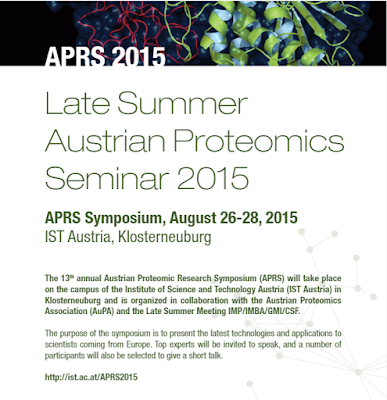14 Temmuz 2015 Salı
Sleep deprivation changes visible at the genome level!
I'm not calling anybody out or anything but there are a lot of people in this field that don't seem to sleep very much. Maybe its a bias toward the people that I know, but I feel like if I'm stuck on something at 2 or 3am I've probably got a pretty good chance of getting in touch with somebody. Heck, maybe I've got a better chance than I do at 3pm.
This interesting study at Uppsala (described in this simple blurb here) took a look at what happens if we skip a full night's sleep and the results are pretty interesting. After skipping just one night of sleep you can see differential regulation at the genetic level. Not something rapid like the phospho- or kinome level, but actually genetic abundance issues.
Now there's always this question for genetic abundance changes -- does this really translate to anything at the protein abundance level? Might be an interesting follow-up for someone (hint?).
12 Temmuz 2015 Pazar
PD 2.0 workshop for Cambridge!
Hey Cambridgians and Bosticians! Lets waste a day away talking about the awesome power of Proteome Discoverer 2.0.
This is an interactive workshop. Intro slides for maybe an hour and then live demonstration. We'll start with easy simple workflows and work our way up to crazy stuff. Along the way I'll take notes on your comments/suggestions and pass your feedback onto the programmers and PD team.
If we have time I'll show you what new special powers are coming in the next version.
If you want come, email Susan.Bird@ThermoFisher.com
11 Temmuz 2015 Cumartesi
Outstanding review on proteogenomics!
Proteogenomics is some great stuff. But it isn't easy stuff yet. You might notice from recent blog posts that its starting to become a bit of an obsession of mine... The promise is there. The data is there, but integrating RNA-Seq data with Proteomics is still no easy task.
For an overview of where we are (as of 2014) you should check out this great review in Nature Methods from Alexey Nesvizhskii. It is open access, remarkably clear, and very thorough.
10 Temmuz 2015 Cuma
9 Temmuz 2015 Perşembe
Reporter ion proteomics probes morphine tolerance and addiction
I love the city of Baltimore. It has its problems, though. Chief among them might be our new title as "the heroin capital of the US..." There is obviously some sort of a link between this fact and our extremely high crime rates. Opiates like morphine and heroin, though, are just about ubiquitously abused throughout the world and sinister everywhere.
To gain insight into the function of these abused substances, Steve Stockton et al., used an elegant quantitative approach to study the effects of morphine on subcellular fractions from synaptic cells. After a lengthy and thorough sample preparation technique they used iTRAQ on an Orbitrap Velos to find proteins disregulated by the drug.
Now, I'm no neuroscientist, and I'm not going to pretend I understand what they found and its impact on their field, but anything that gets us closer to understanding opiate tolerance and addiction gets categorized under AWESOME in my book. I really can only assess the methodology and they did a nice job. The paper is currently in press at MCP and open access and you can find it here.
How to sort your quantification report by individual ratios in PD 2.0
This question has come up a couple of times. So I have these nice ratios now. But what if I want to sort by one of them. I can click and click and I can't sort by individual ratios.
You need to change one thing in the Advanced Tab in your Consensus report:
Create Separate quan columns in your Peptide and Protein Quantifier. Now you'll get a completely separate column for the Ratio counts and variance for that channel. And you can sort by any one that you want to.
6 Temmuz 2015 Pazartesi
Intro to proteomics workshop in October!
From the inside its easy to forget how daunting proteomics is.
One talk I saw a slide from recently referred to "the tyranny of the mass spectrometer". If you're on the outside its hard to know what questions to ask and what is easy to do with the technology vs what is hard. For those of us on the inside, having a more knowledgeable customer base or collaborators only serves to make our lives easier.
Whats the solution? More education! And workshops geared toward researchers who want to know:
1) What can the MODERN mass spectrometer do
2) How can it help me to do it
3) What is a reasonable experiment vs. what is an extremely difficult one.
You can register for this one in Germany here. What we need is a bunch of these in every country!
Kaydol:
Yorumlar (Atom)
Popular Posts
-
A recent paper in PNAS makes the statement in the title "Protein Carbamylation is a Hallmark of Aging. You can find it here . They find...









